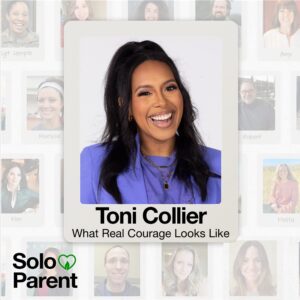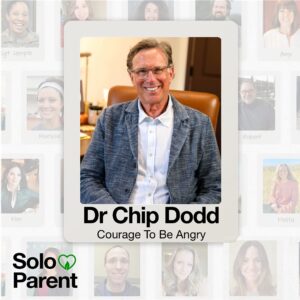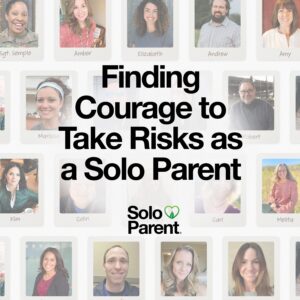Guest: Christopher Cook, author, pastor, and leadership coach
There are parts of our story we wish we could cut out completely. Traumas we’d rather forget. Seasons that brought more pain than we ever thought we could bear. As solo parents, those experiences often leave a deep imprint, not just on our hearts, but on how we show up in the world, and for our kids. We long for peace, but instead find ourselves stuck in survival mode, trying to cope through willpower, overthinking, or staying busy just to avoid the ache.
But what if peace isn’t on the other side of getting better? What if healing actually begins when we stop trying to outrun our pain?
In this vulnerable and deeply grounding episode, we’re joined by Christopher Cook, author of Healing What You Can’t Erase. With raw honesty and lived experience, he invites us into the process of true transformation, one that doesn’t deny the hurt, but gently asks us to sit with it, name it, and choose to move through it.
Key Insights from This Episode
- You don’t have to strong-arm your way to peace
- Overthinking is motion, not movement
- Grief doesn’t mean you’re weak…it means you’re human
These aren’t surface struggles. They’re the daily tension points many solo parents quietly carry, and they’re exactly where healing can begin.
You don’t have to strong-arm your way to peace
It’s easy to believe that healing is something we have to earn. Push harder, try more, fix ourselves. But as Christopher says, “Willpower is great for short-term goals, but it will never transform your heart.” That kind of striving, especially when it comes from a place of fear or self-protection, can actually keep us from the deeper surrender that healing requires.
Robert reflected on this too, sharing how his own journey began with pure survival and willpower after his divorce. “I’m kind of grateful I started there,” he said, “because eventually, I hit a wall and realized, I can’t do this on my own.” That breaking point wasn’t failure. It was the beginning of transformation.
When we try to heal through self-help alone, we end up managing symptoms instead of addressing the root. Real peace begins with surrender, not control.
Overthinking is motion, not movement
For many solo parents, staying in our heads feels safer than feeling what’s going on in our bodies. Elizabeth named this with refreshing honesty: “My brain starts spinning so I don’t have to feel what’s going on in my chest or stomach.” Overthinking becomes a coping strategy, a way to stay in control—but it rarely leads to peace.
Christopher described it as “like being on a stationary bike. You’re exerting effort, but you’re not going anywhere.” In truth, overthinking often masks deeper fears—like fear of abandonment or not being taken care of. When we slow down and ask, “What am I actually afraid of?” we begin to name the roots instead of just trimming the branches.
Peace isn’t the absence of thought, it’s the presence of stillness, even in the unknown.
Grief doesn’t mean you’re weak…it means you’re human
One of the most courageous things you can do as a solo parent is allow yourself to grieve. Whether it’s the loss of your family as you knew it, the loss of dreams, or the pain of what your kids are experiencing, grief often feels like a hole we’ll never come out of.
But as Christopher reminded us, “We don’t get over grief. We go through it. And what we don’t grieve becomes complicated and prolonged.” The temptation to shut it down, to stay productive, numb out, or slap spiritual platitudes on it, is real. But grief isn’t a detour. It’s part of the journey.
Elizabeth added, “I was afraid if I started grieving, I’d never stop.” But what she’s found instead is that grieving has helped her come out of shame. “I can now look at things that happened to me and say, that wasn’t who I am. That was something that happened to me.” Naming the pain helped her separate it from her identity.
Healing begins when we stop pushing grief away and start giving ourselves permission to feel it.
Listener Question:
“When my child is misbehaving or acting out, how can I show them unconditional love instead of frustration or disappointment?”
Elizabeth responded vulnerably: “Sometimes my frustration is more about my own shame—like if my son is acting out, I feel like a bad parent. So I respond from that place.” She reminds us that it’s important to separate our child’s behavior from their identity—and our own.
Robert offered a helpful framework: “There are two things I want my kids to know. One: who they are to me never changes. They’re a 10 out of 10. Two: behavior is separate. If they’re acting out, I might say, ‘You’re still a 10 to me, but that decision was a 4.’” It allows for correction without shame.
Unconditional love doesn’t mean you ignore the behavior. It means you affirm identity while you address it.
Resources Mentioned in This Episode:
Christopher Cook is a leadership coach, author, and podcast host focused on transformation and wholeness.
- Healing What You Can’t Erase by Christopher Cook
- Win Today with Christopher Cook – Weekly podcast focused on mental, emotional, and spiritual health
We want to answer any Solo Parent questions you may have. Submit your listener questions HERE.
Additional Resources:




